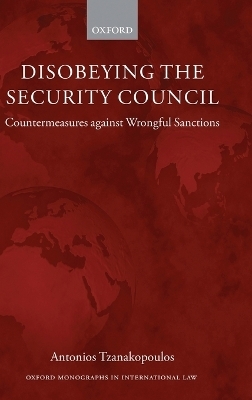
Disobeying the Security Council
Countermeasures against Wrongful Sanctions
Seiten
2011
Oxford University Press (Verlag)
978-0-19-960076-2 (ISBN)
Oxford University Press (Verlag)
978-0-19-960076-2 (ISBN)
In the last few years, the Security Council has imposed highly controversial sanctions on both individuals and States, some of which can be considered to violate international law. This book argues that the law of international responsibility allows States to disobey these obligations when they would result in a serious violation of human rights.
This book examines how the United Nations Security Council, in exercising its power to impose binding non-forcible measures ('sanctions') under Article 41 of the UN Charter, may violate international law, in the sense of limits on its power imposed by the UN Charter itself and by general international law, including human rights guarantees. Such acts may engage the international responsibility of the United Nations, the organization of which the Security Council is an organ. It then proceeds to assess how and by whom the engagement of this responsibility can be determined. Most importantly, the book discusses how and by whom the responsibility of the UN for unlawful Security Council sanctions can be implemented. In other words, how the UN can be held to account for Security Council excesses.
The central thesis of this work is that States can respond to unlawful sanctions imposed by the Security Council, in a decentralized manner, by disobeying the Security Council's command. In international law, this disobedience can be justified as constituting a countermeasure to the Security Council's unlawful act. Recent practice of States, both in the form of executive acts and court decisions, demonstrates an increasing tendency to disobey sanctions that are perceived as unlawful. After discussing other possible qualifications of disobedience under international law, the book concludes that this practice can (and should) be qualified as a countermeasure.
This book examines how the United Nations Security Council, in exercising its power to impose binding non-forcible measures ('sanctions') under Article 41 of the UN Charter, may violate international law, in the sense of limits on its power imposed by the UN Charter itself and by general international law, including human rights guarantees. Such acts may engage the international responsibility of the United Nations, the organization of which the Security Council is an organ. It then proceeds to assess how and by whom the engagement of this responsibility can be determined. Most importantly, the book discusses how and by whom the responsibility of the UN for unlawful Security Council sanctions can be implemented. In other words, how the UN can be held to account for Security Council excesses.
The central thesis of this work is that States can respond to unlawful sanctions imposed by the Security Council, in a decentralized manner, by disobeying the Security Council's command. In international law, this disobedience can be justified as constituting a countermeasure to the Security Council's unlawful act. Recent practice of States, both in the form of executive acts and court decisions, demonstrates an increasing tendency to disobey sanctions that are perceived as unlawful. After discussing other possible qualifications of disobedience under international law, the book concludes that this practice can (and should) be qualified as a countermeasure.
Antonios Tzanakopoulos is Lecturer in Public International Law at University College London. Prior to that, he taught at the Universities of Oxford and Glasgow. He studied law in Athens, New York and Oxford. Antonios is a qualified lawyer with the Athens Bar in Greece, Associate Editor for the Oxford Reports on International Law in Domestic Courts, and collaborateur scientifique of the Hellenic Institute for International and Foreign Law.
1. Responsibility as a Form of Accountability ; 2. Attribution of Conduct to the UN ; 3. The Element of Breach ; 4. Judicial Determination ; 5. Determination by States ; 6. The Content of International Responsibility ; 7. Implementation through Self-Enforcement ; 8. General Conclusion
| Reihe/Serie | Oxford Monographs in International Law |
|---|---|
| Verlagsort | Oxford |
| Sprache | englisch |
| Maße | 163 x 240 mm |
| Gewicht | 552 g |
| Themenwelt | Recht / Steuern ► EU / Internationales Recht |
| Recht / Steuern ► Öffentliches Recht ► Völkerrecht | |
| Sozialwissenschaften ► Politik / Verwaltung ► Europäische / Internationale Politik | |
| ISBN-10 | 0-19-960076-7 / 0199600767 |
| ISBN-13 | 978-0-19-960076-2 / 9780199600762 |
| Zustand | Neuware |
| Haben Sie eine Frage zum Produkt? |
Mehr entdecken
aus dem Bereich
aus dem Bereich


